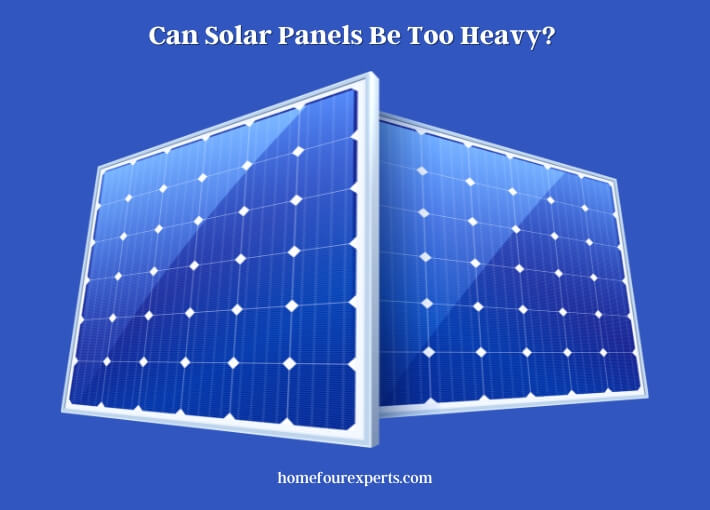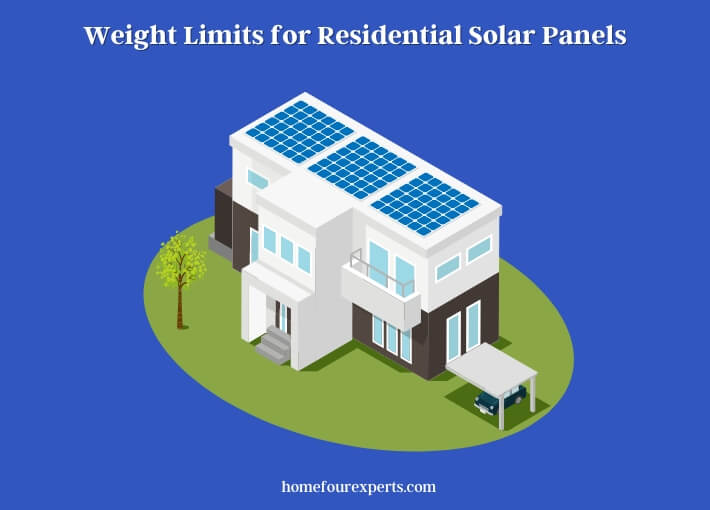As the world shifts towards renewable energy sources, solar energy is becoming increasingly popular among homeowners and businesses. With the numerous benefits that solar energy offers, such as cost savings and reduced environmental impact, it’s no surprise that more people are considering installing solar panels on their roofs.

It’s essential to consider all aspects of solar panel installation, including the weight of the panels. Solar panels are made up of multiple layers of materials and can vary in weight depending on their size and number. This weight can impact the structural integrity of your roof, and it’s crucial to ensure that your roof can support the weight of the solar panels before installation.
Solar Panel Basics
Solar panels are devices that convert sunlight into electricity. They are made up of multiple layers of materials, including silicon, metal, and glass. When sunlight hits the solar panel, it excites the electrons in the silicon, generating an electric current.
Solar panels come in various sizes and types. The most common types are crystalline and thin-film solar panels. Crystalline solar panels are made up of multiple silicon cells, while thin-film solar panels are made by depositing a thin layer of photovoltaic material onto a substrate.
The efficiency of a solar panel is measured by its ability to convert sunlight into electricity. The efficiency of solar panels can vary depending on factors such as the type of solar panel, the temperature, and the angle at which the sunlight hits the panel.
Solar panels are typically installed on rooftops, but they can also be installed on the ground or on poles. The orientation and tilt of the solar panel can affect its performance. For example, solar panels facing south and tilted at an angle equal to the latitude of the location tend to generate the most electricity.
Solar panels are a popular and environmentally friendly alternative to traditional energy sources. They offer many benefits, including reduced energy costs and reduced environmental impact. With the right installation and maintenance, solar panels can provide a reliable source of clean energy for years to come.
Weight Considerations for Solar Panels
When considering solar panel installation, it’s crucial to take into account the weight of the panels. Solar panels can vary in weight depending on their size and number, with some panels weighing as much as 50 pounds each. The weight of the solar panels, as well as any additional equipment such as mounting systems and wiring, can impact the structural integrity of your roof.

If your roof is not structurally sound or does not have the sufficient weight-bearing capacity, installing solar panels can be dangerous and can cause damage to your home. Additionally, installing solar panels on an unsound roof can void your home insurance policy.
It’s essential to consult with a licensed professional to determine the weight limitations of your roof and ensure that it can support the weight of the solar panels. A structural engineer or roofing contractor can assess your roof’s weight-bearing capacity and recommend any necessary reinforcements.
The weight of the solar panels, it’s important to consider during the installation process. The installation process can involve heavy equipment and workers moving around on your roof, which can also impact the structural integrity of your roof. It’s essential to hire a reputable solar panel installation company that follows proper safety protocols and takes steps to protect your roof during the installation process.
Weight Limits for Residential Solar Panels
The weight limit for residential solar panels can vary depending on several factors, including the type of roof, the size and weight of the solar panels, and the location of the home. Generally, most roofs can support the weight of solar panels, but it’s crucial to confirm the weight-bearing capacity of your roof before installing solar panels.
To determine the weight limit of your roof, it’s important to consult with a licensed professional. A structural engineer or roofing contractor can assess your roof’s weight-bearing capacity and recommend any necessary reinforcements. They can also determine the weight limit of your roof based on factors such as the type of roof, the age of the roof, and the climate in your area.

Most roofs can support a weight of up to 4 pounds per square foot, which is sufficient for most solar panel installations. Some roofs may have a lower weight-bearing capacity, particularly if they are older or have suffered damage. In these cases, additional reinforcements may be necessary to support the weight of the solar panels.
It’s important to note that the weight of the solar panels is not the only factor to consider. The weight of any additional equipment such as mounting systems, wiring, and inverters should also be taken into account. The installation process can also impact the weight-bearing capacity of your roof, particularly if heavy equipment is required.
If you work with a licensed professional and take steps to ensure that your roof can support the weight of the solar panels, you can enjoy the many benefits that solar energy offers without putting your home at risk.
Weight Limits for Commercial Solar Panels
Commercial solar panel systems can vary significantly in size and weight compared to residential systems. As such, it’s important to consider weight limitations carefully before installing commercial solar panels.
The weight limit for commercial solar panels can depend on several factors, including the type of roof, the size and weight of the solar panels, and the location of the building. Generally, commercial buildings can support higher weight loads than residential buildings, but it’s still crucial to confirm the weight-bearing capacity of the roof before installation.
To determine the weight limit of your commercial roof, it’s important to consult with a licensed professional. A structural engineer or roofing contractor can assess your roof’s weight-bearing capacity and recommend any necessary reinforcements. They can also determine the weight limit of your roof based on factors such as the type of roof, the age of the roof, and the climate in your area.
Commercial roofs can support a weight of up to 10 pounds per square foot or more, which is sufficient for most commercial solar panel installations. Some roofs may have a lower weight-bearing capacity, particularly if they are older or have suffered damage. In these cases, additional reinforcements may be necessary to support the weight of the solar panels.
It’s important to note that the weight of the solar panels is not the only factor to consider. The weight of any additional equipment such as mounting systems, wiring, and inverters should also be taken into account. The installation process can also impact the weight-bearing capacity of your roof, particularly if heavy equipment is required.
Weight Limits for Ground-Mounted Solar Panels
When it comes to ground-mounted solar panels, weight limits are less of a concern than they are for rooftop installations. This is because the ground can typically support more weight than a roof.
It’s still important to consider weight limits when planning a ground-mounted solar panel system. In particular, you’ll need to ensure that the foundation and mounting system can support the weight of the solar panels and any associated equipment.
The weight of ground-mounted solar panels can vary depending on the type and size of the panels, as well as the mounting system used. As a general rule, a standard ground-mounted solar panel system will typically weigh between 3 and 5 pounds per square foot.
To ensure that your ground-mounted solar panel system is installed safely and effectively, it’s important to work with a licensed professional. They can assess the weight-bearing capacity of the soil and recommend any necessary reinforcements or modifications to the foundation and mounting system.
In addition, it’s important to consider the impact of weather conditions on the weight of ground-mounted solar panels. Heavy rain or snow can increase the weight of the panels and may require additional precautions to ensure safety.
Mitigating Weight Issues in Solar Panel Installation
There are several strategies that can be used to mitigate weight issues in solar panel installation, including:
Choosing lighter solar panel models: Solar panels come in different sizes and models, and some are lighter than others. By choosing a lighter model, you can reduce the overall weight of your solar panel system and minimize the impact on your roof.
Using mounting systems designed for your roof: Mounting systems are used to secure solar panels to the roof, and there are different types of mounting systems available. By using a mounting system that is designed for your specific roof type and weight capacity, you can ensure that the solar panels are securely fastened without putting too much weight on the roof.
Distributing weight evenly: When installing solar panels, it’s important to distribute the weight evenly across the roof to avoid putting too much weight on one area. This can be achieved by positioning the solar panels strategically and using appropriate mounting systems.
Adding reinforcements: In some cases, it may be necessary to add reinforcements to your roof to support the weight of the solar panel system. A licensed professional can assess your roof’s weight-bearing capacity and recommend any necessary reinforcements.
Performing regular maintenance: Regular maintenance of your solar panel system can help prevent weight-related issues from developing. This includes checking for any signs of damage or wear and tear and addressing any issues promptly.
Verdict
Solar energy is becoming an increasingly popular and accessible way to power homes and businesses. It’s important to consider the weight of solar panels and the impact they may have on the roof of your building.
For both residential and commercial solar panel installations, it’s crucial to determine the weight-bearing capacity of the roof and take steps to mitigate weight-related issues. By working with a licensed professional and following recommended best practices, you can ensure that your solar panel system is installed safely and effectively.
Remember, when it comes to solar panel installation, safety should always be the top priority. While solar panels can provide significant energy savings and environmental benefits, it’s essential to ensure that they are installed in a way that is safe and sustainable.
If you have any questions or concerns about the weight of solar panels or their impact on your building, it’s important to consult with a licensed professional. They can provide guidance and recommendations based on your specific needs and ensure that your solar panel system is installed safely and effectively.
About This Writer

Hi, I am responsible for the 'Homeowners Power Solutions' category. My name is Liam Jaxon and a licensed technician with 7 years of experience in vehicle batteries, electrical gadgets, and home appliances. My working experience in different residential & light commercial electrical sectors and the automobile industry helped to acquire vast knowledge in this industry.